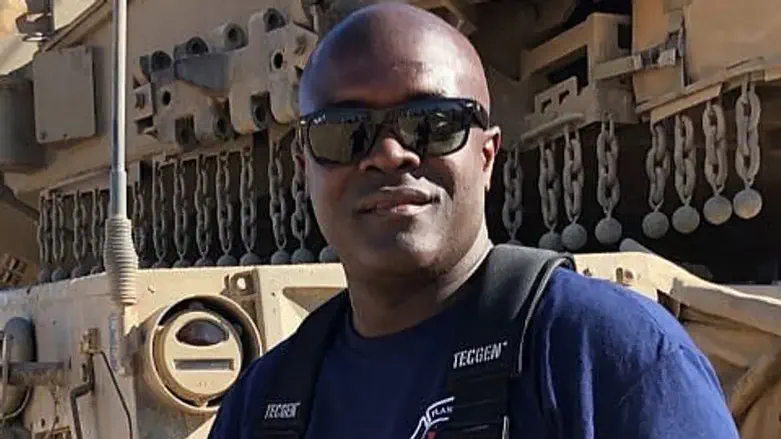

Israel’s Fire and Rescue Services are among the most dedicated and skilled I’ve ever worked with. Their ability to respond swiftly to crises, navigate complex terrain and protect communities under pressure is nothing short of extraordinary. Having trained and fought fires alongside them, I’ve seen their professionalism firsthand—whether battling blazes in the Jerusalem hills or safeguarding northern communities like Afula and Beit She’an. Their commitment to saving lives, even in the face of terrorism-driven arson, is an inspiration to firefighters everywhere.
Right now, Israel is grappling with a crisis that threatens lives and livelihoods. Multiple wildfires are raging across the country—from the Jerusalem hills to northern regions. Authorities have arrested three suspects for arson, and Hamas has openly called for Palestinians to ignite “fields, forests and settlers’ homes.” These deliberate attacks are overwhelming Israel’s 24 firefighting teams, stretching resources to the breaking point. Communities like Mevo Horon, Mesilat Zion and Neve Shalom have been evacuated, and major routes like Route 1 between Jerusalem and Tel Aviv were closed, complicating evacuations and emergency response.
As an American firefighter who has volunteered through the EVP, I know the stakes couldn’t be higher. Civilians are at immediate risk, and the coordinated nature of these attacks demands a robust, unified response. Israel’s Fire and Rescue Services are working tirelessly, but the scale of the crisis calls for global support. That’s why I’m heartened to see countries like Greece, Italy and Croatia sending teams to assist, with planes landing in the coming hours. If needed, the United States stands ready to deploy specialized wildland fire teams through the EVP, just as Israel has supported us in our times of need.
This spirit of mutual aid is at the core of firefighting. When Los Angeles battled devastating wildfires earlier this year, Israel sent firefighting experts to help. When a condominium collapsed in Surfside, Fla., in 2021, the Israel Defense Forces’ search-and-rescue teams were there for us. Now, it’s our turn to stand with Israel.
The EVP, in partnership with the Jewish Federations of North America, has a proven track record of mobilizing American firefighters to support Israel during crises. I’ve led five such missions, and I can say with certainty that our presence makes a difference—not just in fighting fires but in showing Israel that it is not alone.
Beyond immediate response, there’s an opportunity for deeper collaboration between our nations. Israel’s firefighting techniques, honed for their unique terrain and conditions, offer valuable lessons for American firefighters tackling wildland fires in places like California. Their expertise in rapid response and community protection under duress is unparalleled. In return, the United States can share advanced aerial firefighting capabilities and fire prediction models to help Israel contain these spreading blazes more effectively.
By sharing technology and best practices, we can save lives on both sides of the ocean.
I also believe that we must invest in long-term preparedness. My training with Israeli firefighters through the EVP has shown me the value of joint exercises. Establishing permanent exchange programs between American and Israeli fire services would build capacity and strengthen our ability to combat terrorism-related arson attacks. The EVP’s model of sending American firefighters to Israel during crises could be expanded, with regular drills focused on scenarios like the one unfolding now. These initiatives would ensure that we’re not just reacting to disasters but preventing them.
Firefighting is about neighbors helping neighbors, whether they’re across the street or across the globe. Israel’s Fire and Rescue Services embody this ethos, risking their lives to protect communities under unimaginable pressure. As someone who has fought alongside them, I can attest to their bravery and skill. But they can’t do it alone. The arson attacks they’re facing are not just an assault on Israel; they’re an attack on the values of humanity and mutual support that bind us together. An attack on Israel is an attack on the United States, and we will always be there for our Israeli family when they need us.
The EVP is a vital bridge between our nations. It’s a testament to what we can achieve when we unite for a common cause. As I reflect on my five missions to Israel, I’m reminded of the bonds forged in the heat of battle—not just between firefighters, but between people who believe in standing up for what’s right. Israel’s firefighters are doing everything in their power to protect their country, and they deserve our admiration and support.
As I write this, I’m filled with gratitude for the chance to serve alongside Israel’s firefighters. Their courage fuels my own, and their dedication reminds me why I became a firefighter in the first place. Let’s honor their work by standing with them now—through international cooperation and a shared commitment to protecting lives. Together, we can help Israel emerge from this crisis stronger than ever.
So, what can we do?
First, we can advocate for rapid deployment of EVP firefighters to bolster Israel’s efforts.
Second, we can push for stronger U.S.-Israel collaboration on firefighting technology and training.
And finally, we can spread the word about the heroism of Israel’s Fire and Rescue Services, ensuring their story of resilience inspires others to act.
This is a moment for solidarity—for recognizing that when one of us is on fire, we all feel the heat.